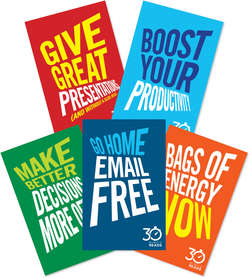Читать книгу The Business Skills Collection: 30 Minute Reads - Bate Nicholas - Страница 4
На сайте Литреса книга снята с продажи.
3
Exercise for Boundless Energy
ОглавлениеThe Challenge
We all know that when we exercise and feel fit not only do we have more energy we build reserves of energy. But it's not easy: exercise is disappearing from our daily lives whether it be less and less need to take the stairs or self-opening store doors. Fitness needs time. Often it needs money. And it certainly needs consistency.
The Detail
As you consider the details of your exercise programme you should ask: what does it need to contain and how do I make it successful?
What does it need to contain? A successful exercise programme will give attention to:
1. CV or cardiovascular. The area with which we are all familiar: the “puff and pant” bit and for most of us the most clearest indicator of our energy levels. Can you half run across Terminal 5, catch your plane and sit down without becoming a heavy breathing, perspiring wreck?
2. Resistance or weights. Often ignored as being not that important and often ignored by the ladies who are fearful of “building big muscle” (it needn't, by the way). Essential for strength and stamina as well as vital for bone health.
3. Balance and stability work. The human body undergoes a huge amount of wear and tear every day. So compare the grace of a young child who can move around a room or park in an apparent effortless manner and that of somebody 40 years on: it's not just that the adult is unfit, it's also that their body is no longer in balance.
How do you make it happen?
1. Everyday not just classes. The gym, exercise classes and even spending money on a personal trainer are wonderful components of your exercise programme but the biggest breakthrough is to make exercise part of your day. Walk when you can. Take the stairs when you can. Get out of that chair. Stretch and move when you can. Notice your posture when you sit. Take the advice from your classes and reading and wire it in to every day.
2. Make it a ritual. We brush our teeth because it is a ritual. It's not on a checklist, it's not on a motivational poster and yet it happens. Daily. Twice daily without fail. Could your exercise get to that point? Of course. One simple idea is to create some kind of simple programme you can do at home. Some stepping, some skipping, the use of a boxing bag. One or two dumb-bells and stretch mats. Keep them all in a box and get yourself to do 15 minutes every day: work up a sweat and get breathless. Supplement it with your classes or big gym sessions.
3. Think bigger than “this is wasting my time”. “I don't have time” is a regular blocker to stepping outside and doing 15 minutes skipping or heading off to the pool at lunchtime. Rather than playing games with excuses, give yourself a mindset shift. You may not have time but how much time do you lose every day by not having enough energy? How many evenings have you lost by feeling exhausted?
4. Start small and easy. Of course (especially if you're a bloke) you too would like to be able to bench press your own body weight. But don't do it first off. It's not just that you are likely to hurt yourself but if you wake up in 48 hours feeling totally wrecked you are much less likely to return to the gym. Demand something of your body sure, but no more than that. If the body is stretched, it will grow and develop to accommodate that challenge. That's all you need: not injury, nor exhaustion.
5. Get good advice and hence good technique. At the start get an expert to show you. And show you fully. Good technique, be it from lifting a weight to how to skip to how to do swim crawl is a tremendous investment in you enjoying yourself and thus keeping it going.
6. Do it properly. Do it properly and do less rather than do it more and do it badly.
7. Variety. Once you do get good at one thing, give your body a new challenge. A new exercise or a new sport or a new goal.
8. Go holistic. Think CV, think resistance, think balance. Work at all three as they will reinforce each other.
The Story
Marcus hates the gym. Always has, always will. Did so at school. Does so at his smart corporate membership in London. He decides to do two things. One is no longer will he drive to the station in the mornings. It'll be a twenty minute walk morning and evening but he now does it rain or shine. Secondly, he no longer takes the elevator up the four floors to his office. He used to be up and down that elevator all day to meetings, or out to Starbucks. That must be a huge amount of CV.
Marcus is feeling good. He's going to do two more weeks of this and then join a lunchtime Pilates class. Step by step but it's working and he's feeling good.
The Q&A
But what should my personal programme be?
Cleary we can't give you that here. But here's how to work it out. Step 1 is a check up with your GP. How fit or not are you? What are his/her concerns? Next take those concerns to your local gym and ask them to create a simple programme for you. Give it six months and then re-evaluate.
The Solution
1. Focus on CV and resistance and balance.
2. Start small and easy.
3. Look for consistency.
4. Build it into dally life.
5. Start.
